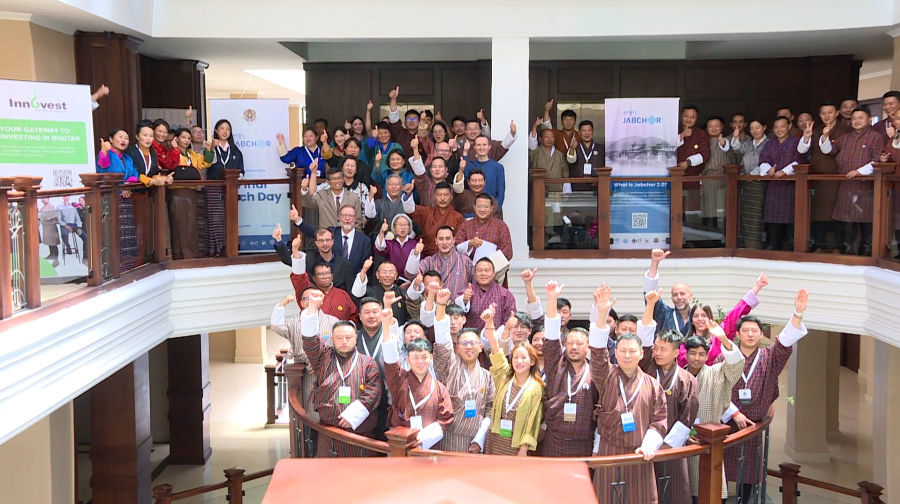
In this season of Jabchor 2.0, ten entrepreneurs received Expression of Interest (EoIs) from 20 local and international investors. Jabchor 2.0 is a platform to support startups and export-focused businesses that struggle to get collateral loans. After months of expert mentoring, the final pitching took place in Thimphu yesterday.
Launched two months ago, the equity financing platform helps businesses in manufacturing, IT, services, and green sectors to pitch their ideas and connect with investors.
Ten entrepreneurs pitched their ideas. Eight signed 15 EoIs with both local and foreign investors on the spot. Five of those were signed during a virtual session, which also saw the remaining two businesses receive EoIs.
Bishal Dhakal’s BillsToTrack.com is a cloud-based Software as a Service (SaaS) platform. It replaces paper receipts with digital ones that businesses can share via WhatsApp and email.
Bishal needed Nu 2 M for operations, branding, and marketing. He offered 20 per cent equity and secured four investors.
He said, “Using the fund that I secured from Jabchor, I want to build a capable team. After enhancing the website, I want to not only popularise it within Bhutan, but also outside the country.”
Similarly, Kuenga Dhendup, co-founder of Kingdom Essences Private Limited, pitched his plan to expand his essential oil and wellbeing products, harvested from pristine highlands, to international markets. He also secured investment.
“Participating in the Jabchor programme has not only helped in securing investment opportunities but also shown us new ways to access the market. Additionally, I could also understand how to do business utilising naturally available resources,” said Kuenga Dhendup, the Co-founder of the Kingdom Essences Private Limited.
Another successful pitch came from AgroNest Centre, a sustainable integrated farming venture. It supplies fresh and smoked trouts from Bongo, Chhukha, to local hotels and restaurants. The team plans to scale up and supply high-end hotels, institutions, and health-conscious consumers.
The founder of the centre Kumar said, “After having participated in Jabchor, I understood that we should not operate as a small, sole-proprietorship business. Rather, we need to expand and aim to export the products outside of Bhutan. Additionally, I got to know how to secure Foreign Direct Investments and do business at a larger scale.”
The signed EoIs may turn into real investments if the businesses prove viable. All formal agreements must be completed within 90 days of signing.
“For the investors, Innovest will ensure confidence and trust in their investments. And for the young entrepreneurs, they will have continued mentoring and post-investment support,” said Jigme Tenzin, the Co-founder of Innovest.
“The Department is looking into making it a long-run programme where we have this kind of platform created for entrepreneurs to up-scale and then where our investors can also come in and invest in viable businesses that they want to,” said Chumo Wangmo, the chief programme officer from the Department of Employment and Entrepreneurship.
The organisers said that the startups that did not receive investments can still opt for crowdfunding or list under the Small and Medium-sized Enterprises (SME) board of the Royal Securities Exchange of Bhutan.
Jabchor 2.0 began with 28 business ideas.
The platform is an initiative of the Department of Employment and Entrepreneurship in partnership with Innovest. It is funded through the Economic Stimulus Programme.
Kelzang Chhophyel
Edited by Sangay Chezom









